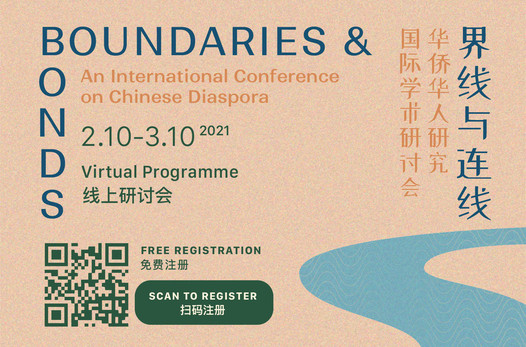Upcoming Events
Feature Events
Boundaries and Bonds: An International Conference on Chinese Diaspora
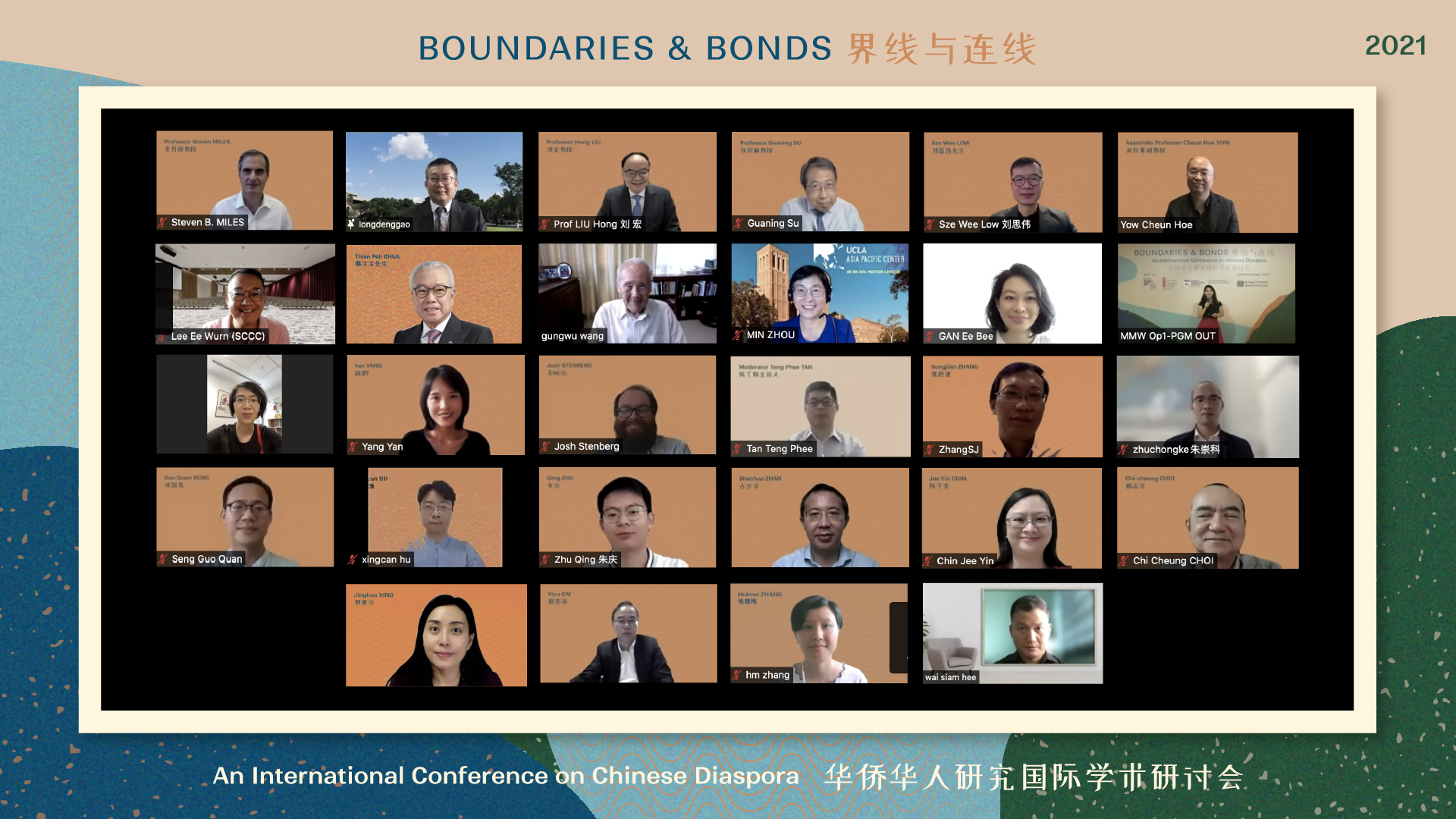
Boundaries and Bonds: An International Conference on Chinese Diaspora
On October 2 and 3, 2021, the "Boundaries and Bonds: An International Conference on Chinese Diaspora" was successfully held. It was organised by the Nanyang Technological University (NTU) Chinese Heritage Centre (CHC) and the NTU School of Social Sciences in collaboration with the Singapore Chinese Cultural Centre and supported by the Singapore Society of Asian Studies. The online conference invited scholars from Singapore and abroad to share their observations and reflections on the Chinese diaspora around the world, and to explore how Chinese migrants continue to reconstruct their subjectivities at the global, regional, community, and local levels, in order to re-examine and redefine the boundaries and connections of the Chinese diaspora in various regions and at various levels.
The conference officially commenced on the morning of Oct 2. Prof Wang Gungwu, a renowned scholar in the field of Chinese diaspora studies and also an honorary board member of the NTU CHC, Prof Zhou Min and Ms Ms Gan Ee Bee, both CHC board members, as well as Dr Chua Thian Poh, President of the Singapore Chinese Cultural Centre, graced the opening. The opening ceremony started with speeches by Prof Su Guaning, Chairman of CHC and President Emeritus of NTU, and Mr Low Sze Wee, President of Singapore Chinese Cultural Centre. Professor Su Guaning welcomed all the participating scholars and introduced the organisers and theme of the conference. Prof Su believed that the conference’s topics were rich and diverse and hoped that the valuable insights of scholars would be well-showcased and ignite new ideas. He also wished the conference success.
Mr Low Sze Wee reviewed the various scholarly activities organised by the Singapore Chinese Cultural Centre in collaboration with CHC. He believed that the conference could overcome the boundaries of time and space to explore the different experiences of disparate overseas Chinese, and would promote research into Chinese diaspora studies in both breadth and depth.
The keynote address segment was hosted by Assoc Prof Yow Cheun Hoe, Director of the Nanyang Technological University's CHC, Head of the Chinese Department, and Director of the Chinese Language and Culture Centre. Prof Yow introduced the three keynote speakers, including their research areas and academic positions.

The first keynote speaker was Prof Steven Miles, Head of the Division of Humanities, Hong Kong University of Science and Technology, whose speech was titled "Prelude to Diaspora: Revisiting Boundaries in the Study of Chinese Migration". Through a case study of external migrating societies in the Pearl River Delta of Guangdong in the 18th and 19th centuries, Prof Steven Miles focused on examining the migration practices of the Cantonese people along the Delta and the West River basin, analysing their motivations for migration and how they used local policies to adapt to their new lives after migration. He further explored how these migration practices paved the way for their future overseas and overland migrations beyond the territorial boundaries of the Qing Dynasty and Republican China.

The second keynote speaker, Prof Long Denggao, Director of the Centre for Chinese Entrepreneur Studies and Professor from the School of Humanities and Social Sciences at Tsinghua University, gave a speech titled "Transnational Flow of Human Capital and the Financial Networks". Prof Long examined three main groups of migrants and their financing networks: Chinese workers in the 19th century, family financing and the chain of Chinese going abroad before the 1950s, and undocumented migrants, smugglers, and their international financial networks in Fuzhou from 1980 to 2010. The examination of the above aspects is used to understand the mechanisms of transnational human capital flows and the transnational financing networks formed around transnational migration. In other words, the little-known private transnational financing network is formed through the realisation of future gains of human capital in the process of emigration.

The third keynote speaker, Prof Liu Hong, Tan Lark Sye Endowed Chair Professor of Public Policy and Global Affairs, Professor, School of Social Sciences, and Director, Nanyang Centre for Public Administration, NTU, presented the topic "Deciphering the Dynamics and Characteristics of New Chinese Diaspora in Singapore, 2010-2020: Identity, Political Economy, and Transnational Network". Prof Liu attempted to go beyond the traditional paradigm of migration studies, in which the theoretical framework of identity, integration, and transnationalism is usually used by scholars. Instead, he analysed the transmutation of Singapore's Chinese society in the last decade from a socio-political and economic perspective. Prof Liu pointed out that the new political and economic development pattern, the accelerated construction of identity, and the continued transnationalism have been at the core of pluralistic transformation in the past decade. The key issue facing the Chinese community in Singapore is identity - while politics is dominant in identity construction, economics is also an important component in shaping the development trajectory and identity construction of Singapore’s new Chinese diaspora.
The first panel discussion, themed "Identities and Concepts", was moderated by Assistant Professor Zhou Taomo from the Department of History, NTU, Singapore. The first panellist Rachel Leow, Senior Lecturer (Associate Professor), Modern East Asian History, University of Cambridge, UK, presented a sharing on the theme of "Constructing Race and Gender in Southeast Asian Chinese Migration: Chen Da and the Making of Huaqiao Patriarchy". She focused on Chen Da's sociological research activities and related findings on the Chinese diaspora, pointing out that Chen Da's research findings on Chinese immigrant groups overlooked both gender and race. Assoc Prof Leow analysed this blind spot to show the normative rather than empirical aspect of Chen Da's sociological research on the Chinese diaspora.
Seng Guo Quan, Assistant Professor of the Department of History at the National University of Singapore, presented "Revolutionary Cosmopolitanism and its Limits: The Chinese Communist Party and the Chinese in Singapore, Medan and Jakarta Compared (1945-1949)", analysing the ethnic pluralism of the Chinese Communist Party's revolution in Southeast Asia and its limits. The historical trajectory of the pluralistic ethnic revolutions executed by the CCP in Southeast Asia showed both similarities and regional differences, due to factors such as the social structure of the Chinese diaspora in Singapore, Medan, and Jakarta, the contingent nature of the decolonisation movement, and local leadership presenting different conditions.
Josh Stenberg, a senior lecturer from the Department of Chinese Studies at the University of Sydney, Australia, focused on Indonesian Chinese contemporary poetry with “‘Finding the Distant Homeland Here’: Contemporary Indonesian Poetry in Chinese”. With more scholarly attention paid to Malaysian Chinese literary works and relatively less research on contemporary Indonesian Chinese poetry, Dr Stenberg hopes to expand his understanding of Chinese literature through his research. He studied a selection of contemporary Indonesian poetry, noting that one of the important purposes of such works is to reassert their affiliation within the transnational Chinese literary community after the Indonesian government's ban on the Chinese language from the mid-1960s until the end of the last century.
The second panel discussion, titled "Transnationalism and Governance," was moderated by Ong Soon Keong, Assistant Professor of Chinese at NTU, Singapore. Yang Yan, a research fellow from the Department of Chinese at the National University of Singapore (NUS), began with a presentation titled "Building Transboundary Connections: The Development Strategies of Oversea-Chinese Banking Corporation During Wartime, 1938-1945". Her research focused on the period from 1938 to 1945, using internal bank documents, special publications, newspapers, oral histories and biographies of employees to discuss the wartime development strategies of Oversea Chinese Banking Corporation (OCBC) in Singapore, and to analyse how OCBC stood out in competition with traditional financial organisations and modern Western banks.
Zhu Qing, Post-Doctoral Research Fellow, Research School for Southeast Asian Studies, Xiamen University, China and a Distinguished Associate Fellow at the Nanyang Research Institute, presented the topic of "Negotiations between the Singapore Chinese Chamber of Commerce and the Colonial Government on the Income Tax Ordinance". He mainly examined the process of negotiation and strategisation on income tax between businessmen groups represented by the Singapore Chinese Chamber of Commerce, the Western Chamber of Commerce, and the Legislative Council, noting that this process enhanced the scalability of tax policy formulation and collection, and could also advance government capacity building and the development of the democratic legal system.
Xing Jinghua, Deputy Director, justify for Chinese Entrepreneurs Studies, Tsinghua University, China, gave a presentation on the topic of "The Charitable Tradition and Cultural Identity of Overseas Chinese". Through her observation of the modern philanthropic giving field, donation motives, intergenerational differences, and behavioural patterns of overseas Chinese in the new era, she found that the philanthropy of overseas Chinese shows an upward trend, among which education is still the main direction of overseas Chinese donations, while philanthropic motives show a diversified trend. The older generation and the new generation of philanthropists have very different characteristics in terms of educational background, living environment, cultural awareness, identity, and mode of operation.
The theme of the lecture by Choi Chi-cheung, Adjunct Professor, Department of History, Chinese University of Hong Kong was "Reenacting ‘Cultural China’ in the Twentieth Century: Communal Festivals in Emigrant and Overseas Chinese Communities". Through his examination of Chinese communal festivals in Singapore, he hopes to understand the community through the organisation and operation of the festivals, and to explore the continuity of Chinese communal festivals as a global phenomenon.
The third panel discussion, titled "Terrains and Representation", was moderated by Jesvin Yeo, Associate Professor, School of Art, Design and Media, NTU, Singapore. Shu Changsheng, Associate Professor, Chinese Culture, University of São Paulo, Brazil, shared about the topic "The Post-1978 Chinese Migration to Brazil: the Qiaoxiang Models and the Rite of Passage". He analysed the current situation of Chinese migration to Brazil since 1978 using the diaspora migration model of Minghuan Li and Diana Wang (2017), and found two main migration patterns of new Chinese immigrants in Brazil: the Yue Qiaoxiang model and the Zhe Qiaoxiang model.
Zhan Shaohua, Associate Professor, Department of Sociology, NTU, Singapore, presented on "Here and There: Hybrid Identity, Dual Engagement, and ICT Use among Chinese Immigrants in Singapore". He focused on the use of social media by Chinese middle-class immigrants in Singapore and the impact of social media on the group's social interactions and identity construction. Chin Jee Yin, Lecturer, Faculty of Social Science, Universiti Tunku Abdul Rahman, Malaysia, reported on the topic of "The Participation of Malaysian Chinese Women in the Workforce: Traditional Values and Choices". Malaysia has the lowest female labour force participation rate in Southeast Asia, yet its Chinese women have a higher labour force participation rate than other ethnic groups in Malaysia. This may be due to the social change in Malaysia that requires more women to participate in the labour force, but there are also more factors that influence this. Traditional Chinese values are one such factor.
Cai Yiyu, Associate Professor, School of Mechanical & Aerospace Engineering, NTU, Singapore, shared his team's research findings on the topic of "Eight Immortals Crossing the Sea: The New Generation of Chinese Scholars in Singapore". He introduced the latest research work of the research team - the digitisation of Haw Par Villa, and also analysed the development and trends of the new generation of Chinese immigrants in Singapore with the case study of Zhejiang University Alumni Association of Singapore.
The fourth panel discussion was on "Literature and Publications", moderated by Dr Tan Teng Phee, Chief Researcher, Singapore Chinese Chamber of Commerce & Industry. Professor Zhu Chongke, Head, Department of Chinese, Sun Yat-sen University (Zhuhai), China, presented the topic "Cross-border, Transnationalism, and De-construction of the Subject in Malaysian Chinese Literature within Taiwan". Focusing on Li Yongping and Ng Kim Chew, he elaborated on Malaysian Chinese Literature in Taiwan through case studies.
Zhang Songjian, Associate Professor, Chinese, NTU, Singapore, presented on the topic of "Wang Xiaoping: A Returned Overseas Chinese Writer in the Time of Cold War". He chose the works of Singapore-born returned overseas Chinese writer Wang Xiaoping as a case study. He presented the history of Wang Xiaoping's growth in left-wing thinking, and explored the complex entanglement between the Cold War and Chinese-language literature, drawing on both critical theory and historical writings.
Hee Wai Siam, Associate Professor, Chinese, NTU, Singapore, shared his insights on "Unattributable Propaganda: On the Pure Literature and Arts Magazine Chao Foon in the Archives of the Asia Foundation". In an attempt to unravel the mystery of the history of the purely literary journal Chao Foon and US aid, he used the archives of the Asia Foundation to explore how the CIA funded the cultural activities of the Union Press in Singapore and Malaysia and founded Chao Foon.
The topic of the presentation by Hu Xingcan, a postdoctoral fellow at Sun Yat-sen University in China, was "A Historical Discovery: the Dissemination of Lu Xun's Woodcut Theories in Malaya". He focused on the history of the spread of Lu Xun's woodcut theories in Malaya, with a follower of his ideas, Tai Yinlong, a Malayan returnee and communist fighter, assuming this important role of spreading his ideas. Hu not only recapped the overall influence of Lu Xun as the source on the Malayan woodcut community, but also focused on Tai Yinlong's inheritance and "rebellion" in the process of spreading woodcut theories, analysing Tai Yinlong's selection and modification of Lu Xun's woodcut theories.
Assoc Prof Yow Cheun Hoe, Director of the NTU CHC, Head of the Chinese Department, and Director of the Chinese Language and Culture Centre, gave the closing address. Assoc Prof Yow found the event’s presentations and discussions very enlightening. The speeches delivered by the three keynote speakers broadened the scope of the conference with outstanding research perspectives, while the discussions on the four panel topics also enriched and deepened our understanding of overseas Chinese. In addition, the event witnessed a successful collaboration among the three organisers, all of which were enthused about the study of Chinese communities and Chinese diaspora, and hope to advance related research in the future.
At the end, Assoc Prof Yow mentioned that Prof Wang Gungwu, a leading researcher in Chinese studies, will soon publish a new book, which coincides with the theme of this seminar, "Boundaries and Bonds", and emphasised that we should pay more attention to relationships, networks and connections in Chinese studies. Finally, he chose to cite the poem "Only Connect!" by E. M. Forster, quoted by Prof Wang, as his concluding remarks.
The international conference attracted more than 1,000 scholars and participants from around the world to gather online and engage in lively discussions on the relevant topics. The success of this conference has truly drawn out the connection between multiple communities. Although the pandemic has created various boundaries for participants, it could not stop us from connecting with one another.
Some papers of this international conference are expected to be published in The International Journal of Diasporic Chinese Studies and the Journal of the Chinese Overseas in 2022.
(Translated from the original text by: Zhang Shu, Visiting Scholar, Centre for Chinese Language and Culture, Nanyang Technological University, Singapore)
界线与连线:华侨华人研究国际学术研讨会
2021年10月2日与3日,由新加坡南洋理工大学华裔馆、新加坡南洋理工大学社会科学学院联同新加坡华族文化中心一起主办,新加坡亚洲研究学会为支持单位的“界线与连线:华侨华人研究国际学术研讨会”成功举行,会议邀请海内外学者通过线上会议的方式,分享他们对世界各地华侨华人的观察与思考,探讨华人移民如何不断地在社群、在地、区域以及全球范围内重构其主体性,以重新审视和定义华侨华人在各区域及各层面的界线与连线。
2日上午,首先由新加坡南洋理工大学华裔馆理事会主席、南洋理工大学终身荣誉校长徐冠林教授和新加坡华族文化中心总裁刘思伟先生分别做开幕致辞。徐冠林教授对所有的参会学者表示欢迎,介绍本次学术会议的主办方和会议主题,徐教授认为此次会议议题丰富且多元,希望能够精彩呈现学者们的宝贵意见,碰撞出思想的火花,最后预祝此次研讨会取得圆满成功。刘思伟先生则回顾了新加坡华族文化中心与南洋理工大学华裔馆合作举办的各类学术活动,认为此次学术研讨会能够克服时间与空间的界限来探讨海外离散人群的不同体验,将促进华侨华人研究在广度和深度上的拓展。
主题演讲由新加坡南洋理工大学华裔馆馆长、中文系主任、中华语言文化中心主任游俊豪教授主持,游教授分别介绍了三位主题演讲嘉宾的研究领域及学术职务等情况。第一位主题演讲嘉宾是来自香港科技大学人文学部主任麦哲维教授,题目为《离散族群的前史:重新探讨华人移民中的界限》。麦哲维教授通过对十八世纪和十九世纪广东珠江三角洲的外向移民社会的案例研究,重点观察广府人在三角洲与西江流域一带的移民实践,分析他们进行移民的动力以及移民后如何利用当地的政策来适应新的生活,以及这些移民实践如何为他们今后超越清朝与民国的领土界线的跨海洋与跨陆地的移民活动作下了铺垫。
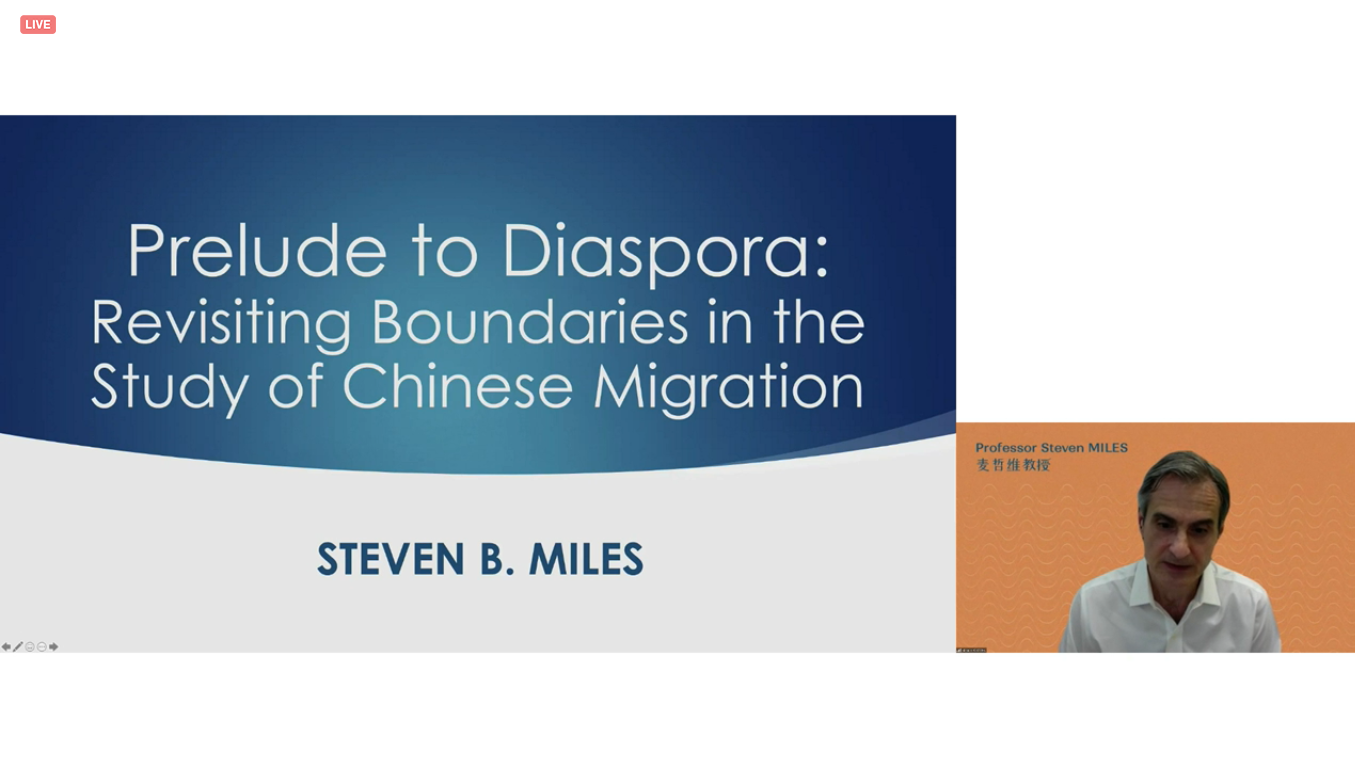
第二位主题演讲嘉宾清华大学华商研究中心主任龙登高教授作了题为《跨国人力资本流动及其融资网络》的主题演讲。龙登高教授主要考察了三种移民群体及其融资网络:19世纪的华工,1950年代以前的家族融资与华侨出国链,1980-2010年的福州偷渡客、蛇头与跨国融资网络。通过以上考察,理解跨国人力资本流动的机理,发现围绕跨国移民所形成的跨国融资网络。换言之,凡此鲜为人知的民间跨国融资网络,是通过出国移民过程中人力资本的未来收益变现而形成的。
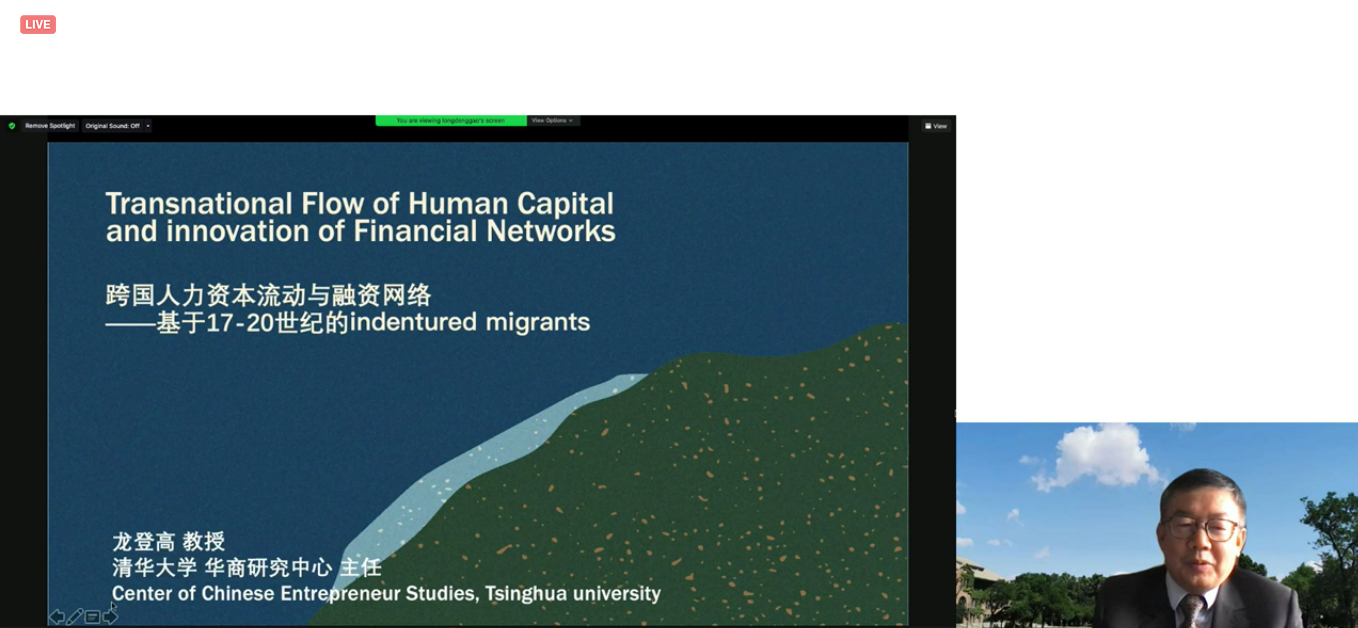
第三位主题演讲嘉宾是新加坡南洋理工大学陈六使讲席教授、社会科学学院教授、南洋公共管理研究生院院长刘宏教授,演讲主题为《新加坡华人社会的嬗变及其动力和特征(2010-2020):身份认同、政经转型、跨国网络》。与学者们通常所用的身份认同、整合、跨国主义的理论架构不同,刘宏教授试图超越传统的移民研究范式,用政治经济学的视野来分析近十年来新加坡华人社会的嬗变。刘宏教授指出,过去十年,新的政经发展格局、身份认同的加速构建,以及持续的跨国主义,是多元转型的核心。新加坡华人社群面临的关键问题是身份认同,虽然政治在身份建构方面处于主导地位,但经济也是塑造新加坡新华侨华人发展轨迹和身份建构的重要组成元素。
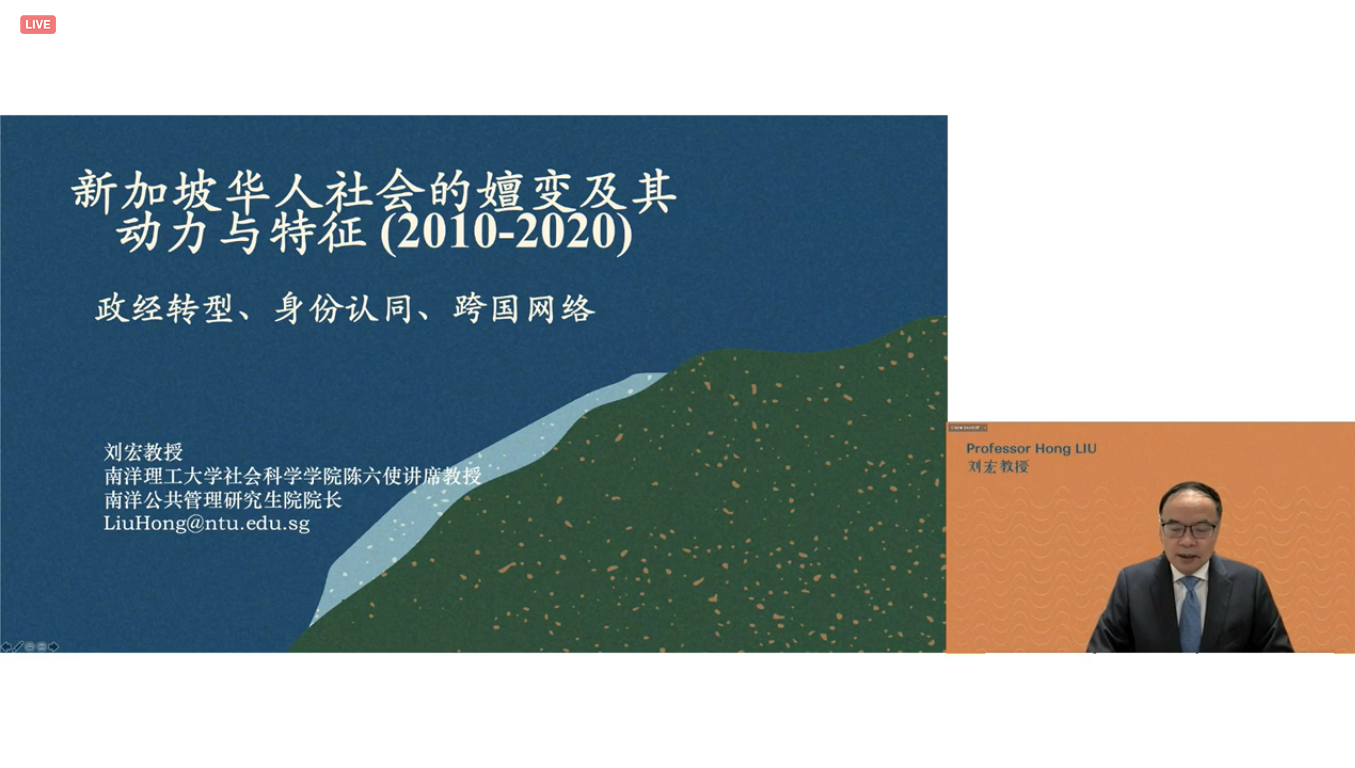
第一个小组讨论的主题是“身份认同与概念”,由新加坡南洋理工大学历史系助理教授周陶沫主持。首先进行分享的是来自英国剑桥大学近现代东亚历史高级讲师(副教授)廖彩亿,题目为《东南亚华人移民中的种族和性别构建:陈达与华侨父权的创造》。她集中关注陈达对华侨的社会学调研活动及形成的相关研究成果,认为陈达对中国移民群体的研究成果显示了其对性别和种族这两种因素的忽视,廖彩亿通过分析这种盲点来展现陈达对于华侨的社会学研究中规范性而非实证性的一面。新加坡国立大学历史系助理教授成国泉演讲的主题是《革命的民族多元性与其局限性:中国共产党与新加坡、棉兰、雅加达华侨华人关系之对比(1945-1949)》,针对中国共产党在东南亚的民族多元性革命与其局限加以分析。因新加坡、棉兰、雅加达的华侨社会结构、去殖民运动的偶然性以及在地领导等因素呈现出不同的状况,中共在东南亚执行的多元性民族革命的历史轨迹既有相似性,也出现了地区差异。来自澳洲悉尼大学中国研究系的资深讲师石峻山则关注了印尼华文当代诗歌,其题目为《“在这里找到了遥遥的祖籍”:印尼华文当代诗歌》。学界对马华文学作品的关注较多,而对印尼华文当代诗歌的研究相对较少,石峻山希望通过自己的研究来扩大对华语文学的理解。他选取了印尼当代诗歌中的部分作品进行研究,认为此类作品的重要目的之一是在经历了印尼政府自60年代中期直至上世纪末的华文禁令之后,重新确认其在跨国华语文学社群中的归属。
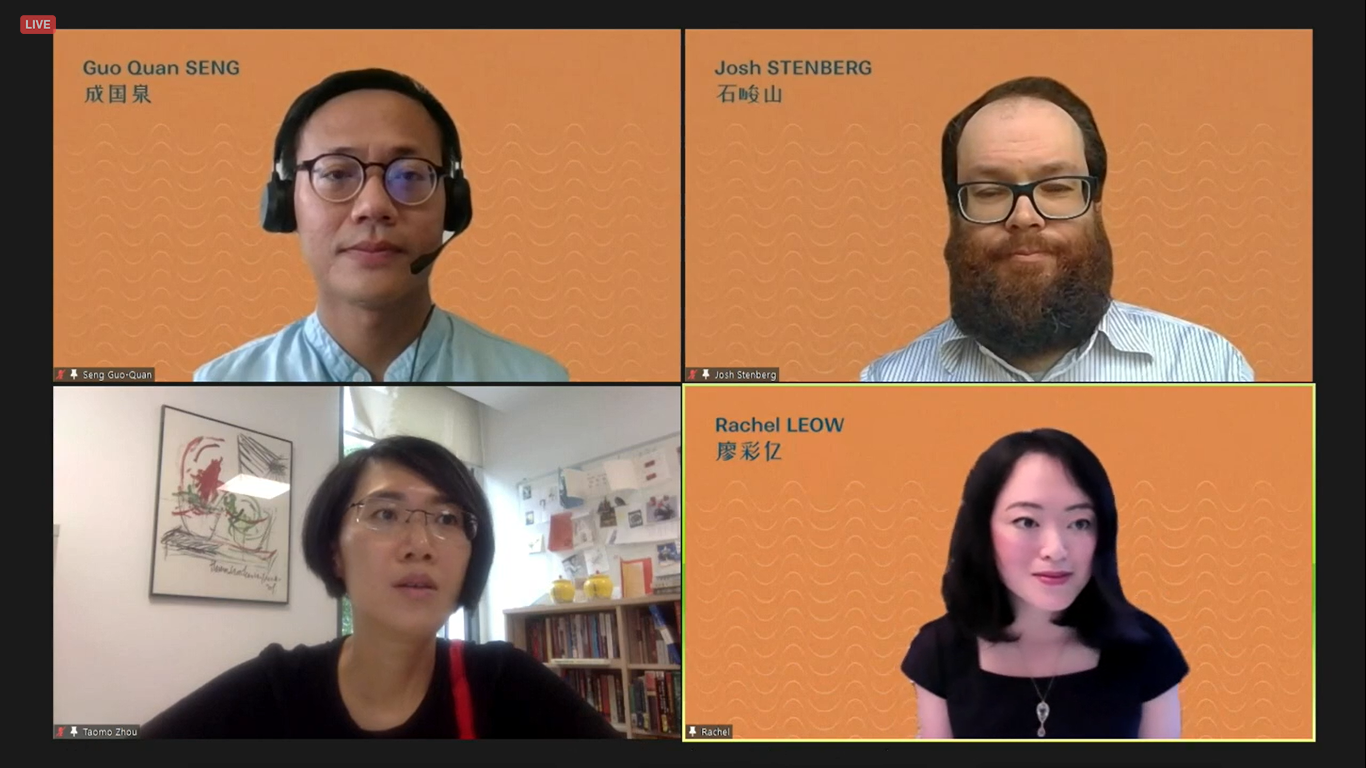
第二个小组讨论的主题是“跨国主义与治理”,由新加坡南洋理工大学中文系助理教授王纯强主持。来自新加坡国立大学中文系的研究员杨妍首先做了主题为《跨界连结:论华侨银行战时发展策略(1938-1945年)》的报告。她的研究聚焦于1938至1945年间,通过银行内部文档、特刊,报章新闻,员工口述历史和传记等资料,讨论新加坡华侨银行战时的发展策略,分析华侨银行如何在与传统金融组织、西方现代银行的竞争中脱颖而出。中国厦门大学世界史博士后、南洋研究院特任副研究员朱庆的报告主题为《新加坡中华总商会与殖民政府入息税征收的协调》。他主要考察了以新加坡中华总商会、西商会为代表的商人团体与立法议会之间就入息税的协商与博弈的过程,认为这个过程增强了税收政策制定和征收的伸缩性,也可以推进政府能力建设和民主法制的发展。中国清华大学华商研究中心副主任、研究员邢菁华以《华侨华人的慈善传统与文化认同》为主题做了报告。她通过对新时代下华侨华人现代慈善事业捐赠领域、捐款动因、代际差异、行为方式等方面的观察,发现华侨华人慈善事业呈现上升趋势,其中教育仍是华侨华人捐款的主要方向,而慈善动因呈现多元化趋势,老一辈和新一代慈善家捐款的教育背景、生活环境、文化认知、身份认同、运作模式等因素有着截然不同的特征,新一代慈善家更注重运用专业化、规范化、社会化、科学化的方法发展慈善事业。香港中文大学历史系客座教授蔡志祥的报告主题为《20世纪文化中国的再展演:侨乡与海外华人社会的社区节日》。他希望通过对新加坡华人社区节日的考察,借助节日的组织和运作来理解社区,探讨作为全球性现象的华人社区节日的延续性问题。
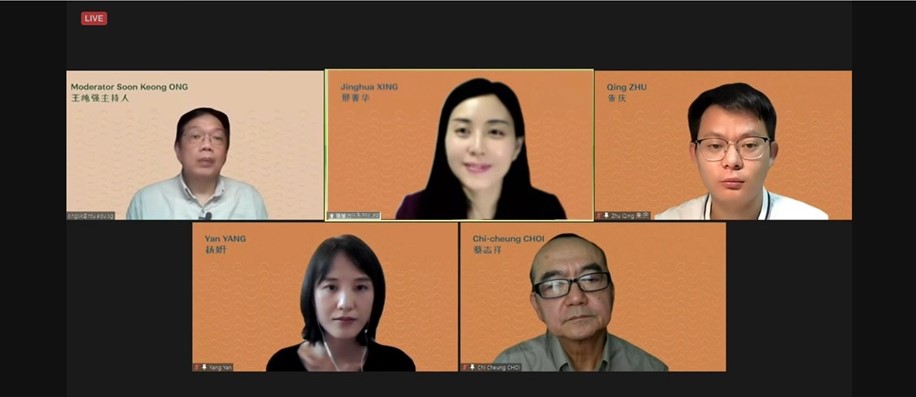
第三个小组讨论的主题是“发展脉络与再现”,由新加坡南洋理工大学艺术、设计与媒体学院副院长杨佩华主持。来自巴西圣保罗大学东方语言文字系的副教授束长生做了主题为《1978年以来中国人移民巴西:侨乡模式和通过仪式》的分享。他利用李明欢、戴安娜·王(2017)的侨乡移民模型对1978年以来中国人移民巴西的现状进行分析,进而发现巴西的中国新移民的移民模式主要有两种:一是粤侨乡模式,二是浙侨乡模式。新加坡南洋理工大学社会学系副教授占少华的报告主题为《此处彼地:新加坡中国移民的混合认同、双重参与以及社会媒体的运用》。他主要考察新加坡的中国中产阶层移民对社交媒体的运用,以及社交媒体对该群体的社会交往和身份构建所产生的影响。马来西亚拉曼大学中文媒体系讲师陈子莹以《马来西亚华裔妇女劳动力参与:传统价值观与抉择》为主题进行汇报。马来西亚的女性劳动力参与率在东南亚地区是最低的,但其华裔妇女的劳动力参与率却比马来西亚其他族群更高。这可能是源于马来西亚的社会变迁,也就是需要更多的妇女参与劳动,然而也还有更多其他因素的影响。华人的传统价值观即是因素之一。新加坡南洋理工大学机械与航空学院副教授蔡奕渔以《八仙过海之新一代新加坡华人学者》为主题分享了他们团队的研究成果。他介绍了研究小组最新的研究工作——虎豹别墅数字化,还以新加坡浙江大学校友会为个案分析新加坡新一代华人移民的发展与趋势。
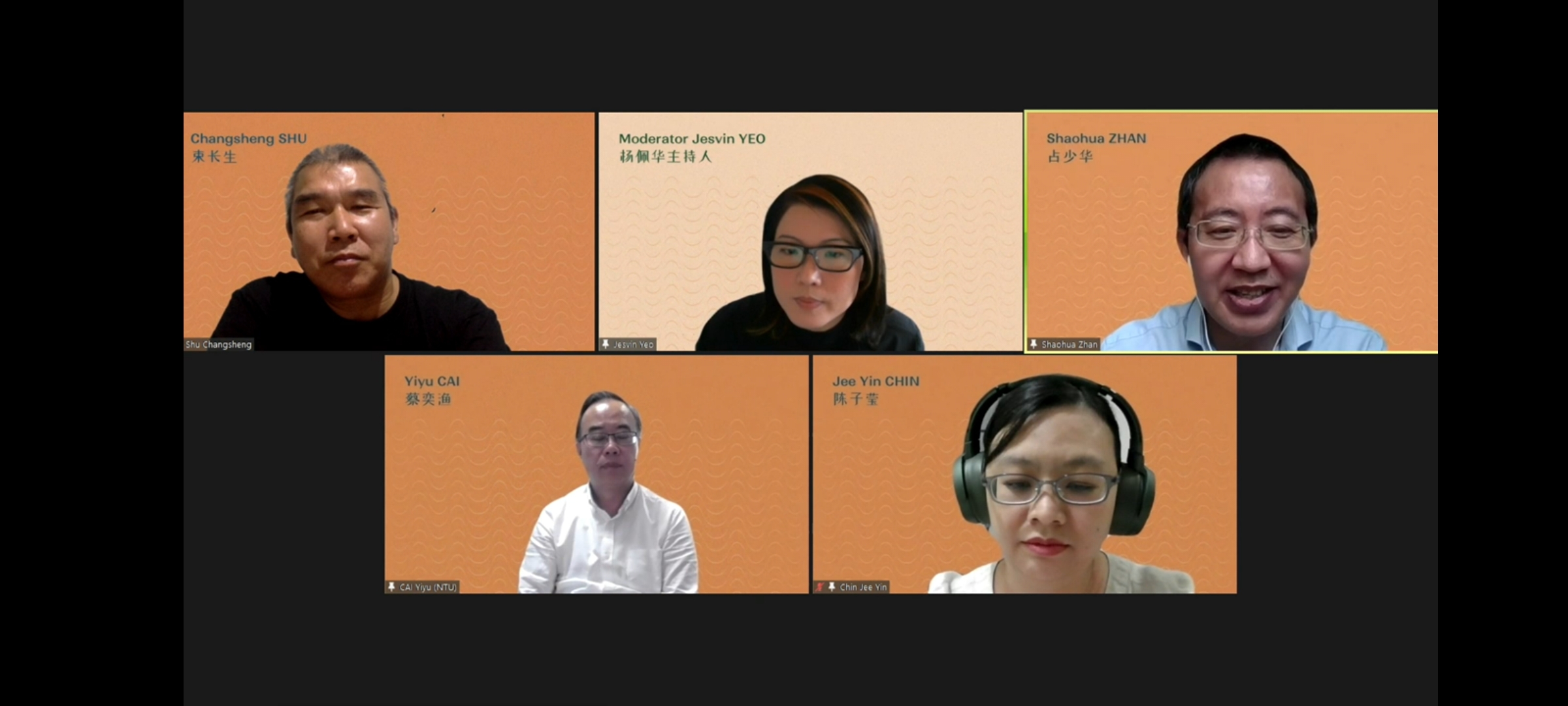
第四个小组讨论的主题是“文字书写与出版”,由新加坡中华总商会首席研究员陈丁辉主持。中国中山大学(珠海)中文系主任朱崇科教授的报告主题为《区域华文文学的越界、跨国与主体解/构:以旅台马华文学为例》。他以李永平和黄锦树为中心,通过个案剖析,对马华在台文学进行阐发。新加坡南洋理工大学中文系副教授张松建以《王啸平:归侨,左翼文学与冷战》为主题进行报告。他选择了出生于新加坡的归侨作家王啸平的代表作品为分析个案,展现王啸平左翼思想的成长史,并兼采批评理论和历史学著作,深入探讨了冷战与华语文学之间的复杂纠葛。新加坡南洋理工大学中文系副教授许维贤的分享以《看不见的宣传:从亚洲基金会档案(1955-1970)看纯文艺期刊<蕉风>》为主题。他主要运用亚洲基金会的档案探讨美国中央情报局如何资助友联在新马的文化活动并创办《蕉风》的始末,试图解开纯文艺期刊《蕉风》与美援历史的谜团。中国中山大学博士后胡星灿的报告主题为《一个史的发现:鲁迅木刻思想的马来亚传播》。他重点梳理鲁迅木刻思想在马来亚的传播历史,鲁迅的木刻子弟——马来亚归侨、共产主义战士戴隐郎承担了这一要职。胡星灿既还原了鲁迅作为源头对马来亚木刻界的整体性影响,同时又关注戴隐郎在传播木刻思想过程中的继承与“反叛”,分析戴隐郎对鲁迅木刻思想的筛选与修改。
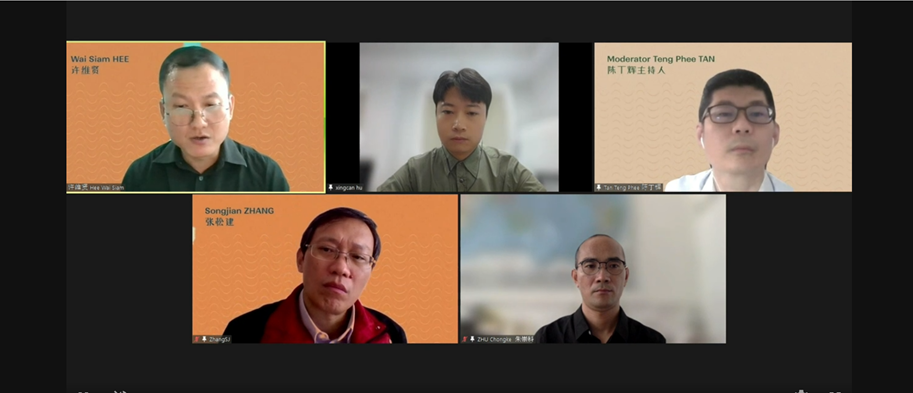
第四个小组讨论的主题是“文字书写与出版”,由新加坡中华总商会首席研究员陈丁辉主持。中国中山大学(珠海)中文系主任朱崇科教授的报告主题为《区域华文文学的越界、跨国与主体解/构:以旅台马华文学为例》。他以李永平和黄锦树为中心,通过个案剖析,对马华在台文学进行阐发。新加坡南洋理工大学中文系副教授张松建以《王啸平:归侨,左翼文学与冷战》为主题进行报告。他选择了出生于新加坡的归侨作家王啸平的代表作品为分析个案,展现王啸平左翼思想的成长史,并兼采批评理论和历史学著作,深入探讨了冷战与华语文学之间的复杂纠葛。新加坡南洋理工大学中文系副教授许维贤的分享以《看不见的宣传:从亚洲基金会档案(1955-1970)看纯文艺期刊<蕉风>》为主题。他主要运用亚洲基金会的档案探讨美国中央情报局如何资助友联在新马的文化活动并创办《蕉风》的始末,试图解开纯文艺期刊《蕉风》与美援历史的谜团。中国中山大学博士后胡星灿的报告主题为《一个史的发现:鲁迅木刻思想的马来亚传播》。他重点梳理鲁迅木刻思想在马来亚的传播历史,鲁迅的木刻子弟——马来亚归侨、共产主义战士戴隐郎承担了这一要职。胡星灿既还原了鲁迅作为源头对马来亚木刻界的整体性影响,同时又关注戴隐郎在传播木刻思想过程中的继承与“反叛”,分析戴隐郎对鲁迅木刻思想的筛选与修改。
Please click here for the conference programme
Please click here for the conference booklet
- Arts & Humanities
- Social Sciences
